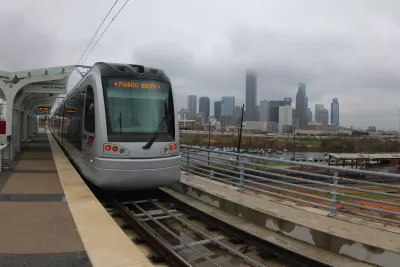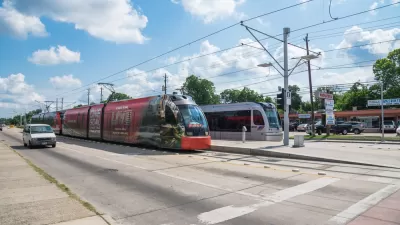While ridership dropped during the pandemic, many 'essential workers' continued to rely on Houston Metro's services, signaling the crucial role of public transit for the city's economy.

Dug Begley describes the findings of a report from Air Alliance, transportation advocacy group LINK Houston and the Robert D. Bullard Center for Environmental and Climate Justice at Texas Southern University that calls for greater funding of public transportation in the Houston region.
"Overall, Metro ridership dropped to about one-eighth normal levels early in the pandemic, leading the agency to drastically scale back bus and train service." But "many said the service offered was a crucial lifeline." According to researcher Nikki Hawkins-Knight, "[w]e cannot continue to build cities and hope to positively impact the health of our economy and communities without frequently assessing the impacts, deficiencies and user needs." Hawking-Knight goes on to say "[t]he transit ecosystem must integrate safety, sanitation, connectivity and overall reliability for it to be a true asset."
"The findings, authors said, point to more transit investment as a way to keep key employees showing up for work, offer a viable and safe option for travel and reduce pollution all at once." Ashley Johnson, director of community affairs at LINK Houston and a study co-author, says "Metro must continue to restore service and equitably implement its Moving Forward Plan as the COVID-19 pandemic demonstrates the vital role public transit plays in the economic vitality of our region."
FULL STORY: Despite fewer people riding Metro in Houston, report makes case for more public transit

Trump Administration Could Effectively End Housing Voucher Program
Federal officials are eyeing major cuts to the Section 8 program that helps millions of low-income households pay rent.

Planetizen Federal Action Tracker
A weekly monitor of how Trump’s orders and actions are impacting planners and planning in America.

Ken Jennings Launches Transit Web Series
The Jeopardy champ wants you to ride public transit.

Washington Legislature Passes Rent Increase Cap
A bill that caps rent increases at 7 percent plus inflation is headed to the governor’s desk.

From Planning to Action: How LA County Is Rethinking Climate Resilience
Chief Sustainability Officer Rita Kampalath outlines the County’s shift from planning to implementation in its climate resilience efforts, emphasizing cross-departmental coordination, updated recovery strategies, and the need for flexible funding.

New Mexico Aging Department Commits to Helping Seniors Age ‘In Place’ and ‘Autonomously’ in New Draft Plan
As New Mexico’s population of seniors continues to grow, the state’s aging department is proposing expanded initiatives to help seniors maintain their autonomy while also supporting family caregivers.
Urban Design for Planners 1: Software Tools
This six-course series explores essential urban design concepts using open source software and equips planners with the tools they need to participate fully in the urban design process.
Planning for Universal Design
Learn the tools for implementing Universal Design in planning regulations.
Heyer Gruel & Associates PA
Ada County Highway District
Institute for Housing and Urban Development Studies (IHS)
City of Grandview
Harvard GSD Executive Education
Toledo-Lucas County Plan Commissions
Salt Lake City
NYU Wagner Graduate School of Public Service





























